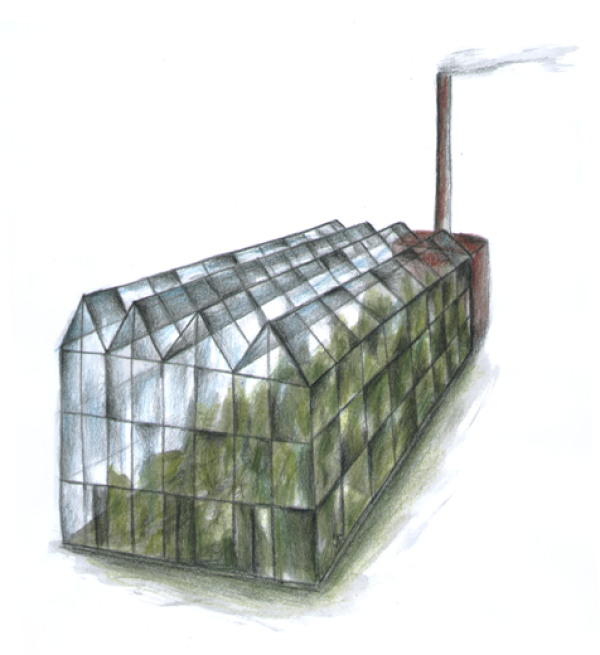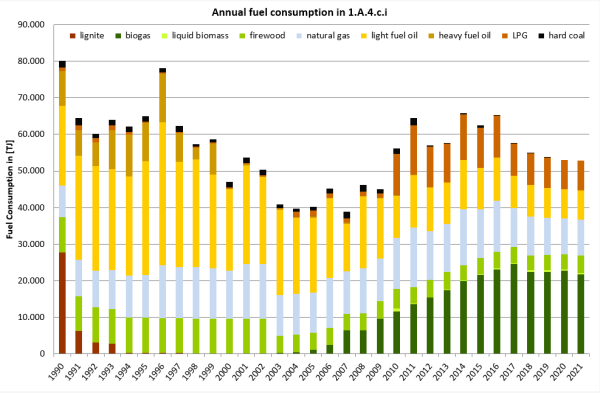meta data for this page
1.A.4.c.i - Agriculture/Forestry/Fishing: Stationary

Short description
In source category 1.A.4.c.i - Agriculture/Forestry/Fishing: Stationary emissions from smaller combustion plants in agricultural facilities and greenhouses are reported.
| Category Code | Method | AD | EF | ||||||||||||
|---|---|---|---|---|---|---|---|---|---|---|---|---|---|---|---|
| 1.A.4.c.i | T2, T3 | NS | CS, D | ||||||||||||
| NOx | NMVOC | SO2 | NH3 | PM2.5 | PM10 | TSP | BC | CO | PB | Cd | Hg | Diox | PAH | HCB | |
| Key Category: | -/- | -/- | -/- | -/- | -/- | -/- | -/- | -/- | -/- | -/- | -/- | -/- | -/- | -/- | -/- |
Methodology
Activity data
For further information on activity data please refer to the superordinate chapter on small stationary combustion.
Emission factors
For further information on the emission factors applied please refer to the superordinate chapter on small stationary combustion.
Table 1: Emission factors for commercial and institutional combustion installations
| NOx | SOx | CO | NMVOC | TSP | PM10 | PM2.5 | PAH | PCDD/F | |
|---|---|---|---|---|---|---|---|---|---|
| [kg/TJ] | [mg/TJ] | [kg/TJ] | |||||||
| Hard Coal | 76.2 | 331.7 | 2,709 | 48.4 | 18.5 | 17.6 | 15.7 | 19,215 | 16.3 |
| Residual Wood | 79.2 | 6.5 | 2,285 | 122.1 | 84.2 | 81.6 | 76.9 | 144,957 | 355.3 |
| Light Fuel Oil | 43.7 | 3.3 | 11.9 | 2.6 | 1.0 | 1.0 | 1.0 | 20.10 | 2.7 |
| Natural Gas | 27.2 | 0.1 | 11.1 | 0.36 | 0.03 | 0.03 | 0.03 | 3.08 | 1.6 |
TSP and PM emission factors are to a large extend based on measurements without condensed compounds, according to CEN-TS 15883, annex I.
Trend Discussion for Key Sources
The following charts give an overview and assistance for explaining dominant emission trends of selected pollutants.
Annual fluctuations of all fuel types in source category 1.A.4 depend on heat demand subject to winter temperatures. Between 1990 and 2014 the fuel use changed considerably from coal & lignite to natural gas & biogas. The consumption of light heating oil decreased as well. As the activity data for light heating oil is based on the sold amount, it fluctuates due to fuel prices and changing storage amounts.
Recalculations
Recalculations were necessary for 2020 due to the implementation of the now finalised National Energy Balance and for 2019 due to changes in the activity data for solid biomass and light fuel oil.
For pollutant-specific information on recalculated emission estimates for Base Year and 2020, please see the recalculation tables following chapter 8.1 - Recalculations.
Planned improvements
There is a running project on new emission factors for small combustion plants using updated data from the chimney sweepers and new measurement data.


